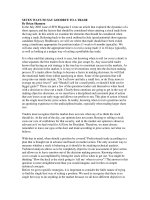trade finance placemat
Bạn đang xem bản rút gọn của tài liệu. Xem và tải ngay bản đầy đủ của tài liệu tại đây (158.82 KB, 2 trang )
Mercury
How Blockchain Can Reshape Trade Finance
Trade financing, where financial institutions provide credit
facilities in order to guarantee exchange of goods, is a centuries
old industry that hasn’t seen much change with the growth
of global trade flows. In 2015 alone, the trade finance market
was measured at more than $10 trillion USD.
1
Delayed payment:
Multiple intermediaries
must verify that funds
have been delivered to the
importer as agreed prior to
the disbursement of funds
to the exporting bank
7
Multiple versions of the
truth:
As financials are sent from one
entity to another, significant
version control challenges
exist as changes are made
8
Deloitte has re-imagined how trade finance can operate leveraging
a Blockchain based infrastructure to drive efficiencies, reduce cost
base and open up new revenue opportunities, like newer models
of credit and funding guarantees backing the trade.
2
Manual contract creation:
The import bank manually
reviews the financial
agreement provided by
the importer and sends
financials to the
correspondent bank
3
Pain Points
of Today’s
Processes
6
Duplicative bills of lading:
Bills of lading are financed
multiple times due to the
inability of banks to verify
their authenticity
5
Multiple platforms:
Since each party across
countries operates on
different platforms,
miscommunication
is common and the
propensity for fraud is high
Invoice factoring:
Exporters use invoices
to achieve short-term
financing from multiple
banks, adding additional
risk in the event the
delivery of goods fails
Delayed timeline:
The shipment of goods
is delayed due to multiple
checks by intermediaries
and numerous
communication points
4
Manual AML review:
The export bank must
manually conduct AML
checks using the financials
provided by the import bank
Future State Vision
Upon purchase, the agreement
of sale between the importer
and exporter is shared with import
bank using a Smart Contract on
the Blockchain
IMPORT
In real-time, the import bank will
have capability to review purchase
agreement, draft terms of credit
and submit obligation to pay to
export bank
2
1
EXPORT
Goods will be inspected by 3rd
parties and the customs agent
in the exporting country - with
all providing their respective
digital signature of approval on
the Blockchain smart contract
After receiving the obligations,
the exporter will digitally sign
Blockchain-equivalent letter of
credit within the smart contract
to initiate shipment
3
4
5
6
Export bank will review the
provided payment obligation
and once approved, a Smart
Contract will be generated on
the Blockchain to cover terms &
conditions and lock-in obligations
During transit, goods will be
transported from Country A
to Country B
Upon delivery, importer will
digitally acknowledge receipt
of goods and trigger payment
Using provided acknowledgement,
Blockchain will automate payment
from importer to exporter via a
Smart Contract
8
7
Blockchain Advantages
Real-time
review:
Financial
documents linked
and accessible
through
Blockchain are
reviewed and
approved in real
time, reducing
the time it
takes to initiate
shipment
Transparent
factoring:
Invoices
accessed on
Blockchain
provide a
real-time and
transparent view
into subsequent
short-term
financing
Disintermediation:
Banks facilitating
trade finance
through Blockchain do not
require a trusted
intermediary
to assume risk,
eliminating the
need for correspondent banks
Reduced counterparty risk:
Bills of lading are
tracked through
Blockchain,
eliminating the
potential for
double spending
Decentralized
contract
execution:
As contract
terms are met,
status is updated
on Blockchain
in real time,
reducing the time
and headcount
required to
monitor the
delivery of goods
Proof of
ownership:
The title available
within Blockchain
provides
transparency
into the location
and ownership
of the goods
Automated
settlement
and reduced
transaction
fees:
Contract terms
executed via
Smart Contract
eliminate
the need for
correspondent
banks and
additional
transaction fees
For more information please contact:
Soumak Chatterjee
Senior Manager
Vikas Singla
Manager
Matthew Lam
Manager
Regulatory
transparency:
Regulators are
provided with
a real-time view
of essential
documents
to assist in
enforcement and
AML activities









